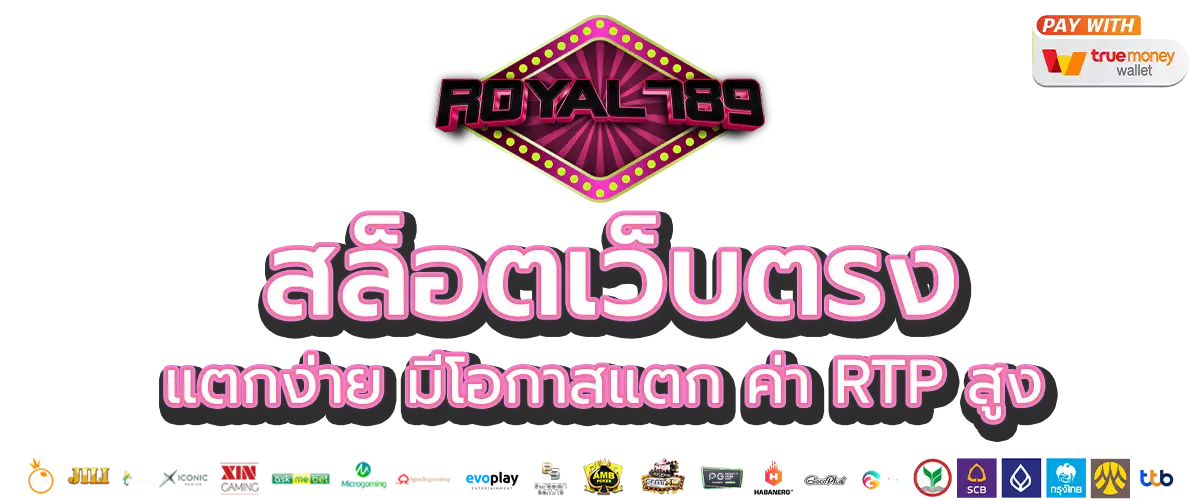

สล็อตเว็บตรง เป็นหนึ่งในเกมที่เข้าถึงได้มากในปัจจุบัน เว็บ สล็อตเว็บตรง แตกง่าย ด้วยการเล่นผ่านโทรศัพท์มือถือสามารถเล่นได้ทุกที่ทุกเวลาตลอด 24 ชั่วโมง ทำให้ได้รับความนิยมอย่างแพร่หลายเหตุปัจจุบัน ทำให้นักพนันส่วนใหญ่หันมาเล่นผ่านเว็บพนันมากยิ่งขึ้น โดยทางตัวเว็บจะมีเกมให้เลือกเล่นหลากหลายจากเกมค่ายดังทั่วโลก ซึ่งได้รับการยอมรับจากหน่วยงานที่เกี่ยวข้อง ว่าสล็อตเว็บตรงแบบง่ายได้มาตรฐานตามหลักสากล ซึ่งมีความน่าเชื่อถือผู้เล่นไม่ต้องกังวลเรื่องกลไกการโกง อีกทั้งยังมีระบบการฝากถอนผ่านบัญชีธนาคารทุกธนาคาร และยังสามารถฝากถอนผ่าน สล็อตเว็บตรง ฝาก ถอน true wallet ไม่มีขั้นต่ํา ใดๆเลย

หลายๆคน อาจจะสงสัยว่า สล็อตเว็บตรง แตก ง่าย ว่าคืออะไร เราจะมาอธิบายง่ายๆว่าสล็อตเว็บตรง เป็นเว็บสล็อตออนไลน์ ที่เปิดให้บริการจากค่ายเกมโดยตรง โดยเป็น API แท้จากค่ายเกมยักษ์ใหญ่ทั่วโลก ที่เอามารวมไว้ให้ทุกคนได้เล่นในเว็บเดียว จึงทำให้มีระบบที่ปลอดภัยไม่ต้องกลัวโดนโกง เพราะว่าทางค่ายเกมมีนโยบายที่ปรับตัวเกมให้มีค่า RTP สูงกว่าปกติ ทำให้โอกาสแต่ของโบนัสง่ายยิ่งขึ้น ถ้าเทียบกับเว็บที่เล่นผ่านเอเย่น สล็อตเว็บตรง แตกง่าย ไม่มี ขั้นต่ำ จึงทำให้ตรงสระลดตรงน่าเล่น กว่าเว็บสล็อตอื่นๆ ที่ได้แอบอ้างว่าเป็นเว็บแท้ โดยเว็บเหล่านั้นจะปรับโอกาสแตกให้น้อยลง และที่แย่ที่สุด เมื่อคุณเล่นจนได้เงิน ก็จะไม่สามารถถอนได้ ด้วยเหตุผลต่างๆ
การเลือกเล่นสล็อตออนไลน์ สิ่งสำคัญที่สุดคือเว็บที่คุณจะสมัครเข้าเล่น ว่าเว็บไหนที่ปลอดภัยและน่าเชื่อถือ โดยทุกวันนี้ สล็อตเว็บตรง แตกง่าย ไม่มีขั้นต่ำ มีมากมายนับพันเว็บ จึงทำให้ผู้เล่นส่วนใหญ่เลือกไม่ได้ว่าเว็บไหนควรจะเล่น ดังนั้นการเลือกเล่น สล็อตเว็บตรง วอเลท จึงเป็นทางออกที่ดีที่สุด เพราะเป็นเว็บที่มีความปลอดภัยได้มาตรฐานตามหลักสากล โดยเราได้ซื้อลิขสิทธิ์แท้จากค่ายเกมมาโดยตรง ทำให้เว็บ สล็อตเว็บตรง ฝากถอน true wallet ไม่มีขั้น ต่ํา มีความโปร่งใส และให้คุณมั่นใจว่าไม่มีการปรับตัวเกมแต่อย่างใด และยังมีเหตุผลที่ควรเลือกเล่นตลอดเว็บตรง ดังนี้

การฝากถอนด้วย True wallet เป็นระบบทางการเงินที่สะดวกและผู้เล่นสามารถทำการฝากถอนได้รวดเร็วไม่ต้องรอนานใช้เวลาไม่เกิน 3 วินาทีในการทำรายการนอกจากนี้ สล็อตเว็บตรง ฝาก ถอน true wallet ไม่มี ขั้น ต่ํา ยังสามารถใช้ True wallet ในการทำกรรมอื่นๆได้อีกด้วยโดยคนไทยส่วนใหญ่นิยมใช้ Application นี้ในการจ่ายค่าสินค้าในชีวิตประจำวันอยู่แล้วเราจึงนำระบบนี้มาบริการเพื่อความสะดวกสบาย
ผู้เล่นที่เป็นสมาชิกกับเว็บตรง ต่างก็รู้กันอยู่แล้วว่าทางเว็บ จะมีทีมงานคอยบริการตอบปัญหา และแก้ไขปัญหาตลอด 24 ชั่วโมง เพื่อคอยบริการให้ลูกค้า โดยถ้าเกิดปัญหาทางทีมงานจะคอยรับเรื่องแล้วแก้ให้คุณได้ทันที ไม่ว่าจะเป็นปัญหาการสมัครสมาชิก, ปัญหาการฝากถอน, สอบถามโปรโมชั่น หรือแม้แต่สอบถามเกมยอดฮิตประจำสัปดาห์ ซึ่งทางทีมงาน จะสามารถตอบทุกปัญหาให้คุณโดยทันที
เล่นสล็อตผ่าน สล็อตเว็บตรง100 จะทำให้คุณเชื่อมั่นได้ว่าข้อมูลส่วนตัวและข้อมูลการทำธุรกรรมของคุณจะถูกปกป้องเป็นอย่างดี โดยไม่ผ่านตัวกลางเพื่อลดความเสี่ยงในการถูกโกง หรือข้อมูลรั่วไหล โดยเว็บจะได้รับการตรวจสอบจากหน่วยงานที่เกี่ยวข้อง เช่น MGA (Malta Gaming Authority) หรือ UKGC (United Kingdom Gambling Commission) ซึ่งมีความน่าเชื่อถือใน ระดับโลก
ทางเว็บสล็อตจะมีกิจกรรมที่น่าสนใจ ให้ลูกค้าทุกคนได้เลือกใช้ไม่ว่าจะเป็น กิจกรรมแชร์รับรายได้, กิจกรรมคืนยอดเสีย, กิจกรรมสะสมแต้ม หรือกิจกรรมต่างๆ ตามช่วงเวลาที่เว็บกำหนด ซึ่งจะช่วยให้ลูกค้าทุกคนสามารถนำมาใช้เพื่อเป็นประโยชน์ในการทำเงินได้ง่ายมากยิ่งขึ้น ดังนั้นทาง เว็บ สล็อตเว็บตรง ไม่ผ่านเอเย่น จึงควรจะมี
พบกับตัวเลือกใหม่ ของเกม สล็อตเว็บตรง แตกง่าย ไม่ล็อคยูส นำเข้าจากต่างประเทศลิขสิทธิ์แท้ 100% เป็นทางเลือกที่ดีสำหรับนักปั่นมืออาชีพที่ต้องการทำกำไร โดยมีโอกาสชนะรางวัลมากยิ่งขึ้น ด้วยค่า RTP ที่สูง และมีคุณภาพเกมที่ดีที่สุด นักปั่นสล็อตจึงไม่ควรพลาด ที่จะลองเล่นเกมสล็อตนำเข้าเหล่านี้ โดยเป็นเกม สล็อตเว็บตรง แท้ มาใหม่ที่เล่นง่าย และแตกง่ายได้รับการยอมรับจากผู้เล่นทั่วโลก ซึ่งเราได้เก็บรวบรวมเพื่อมาเปิดให้บริการ กับนักปั่นทุกคนสามารถเล่นผ่าน สล็อตเว็บตรงที่น่าเชื่อถือ ด้วยความปลอดภัยจากเกมลิขสิทธิ์แท้ ทำให้คุณไม่ต้องกังวลการโกง คุณสามารถเล่นได้อย่างมั่นใจ

มั่นใจได้ทุกเกมเมื่อคุณเข้ามาใช้บริการ กับ สล็อตเว็บตรง 100 ต่างประเทศ ซึ่งรวมที่น่าเล่นเหมือนยกคาสิโนมาให้คุณ ได้เล่นแบบจุกๆ โดยไม่ต้องผ่านเอเย่น ทำให้คุณได้รับการบริการที่ดี และซื่อตรง การสมัครยูสใหม่ที่เว็บตรงจะทำให้ได้รับโอกาสแตกง่ายกว่าปกติ เป็นการต้อนรับผู้เล่นใหม่ได้ทำเงิน โดยทางเว็บตรงมีการถอนเครดิตไม่อั้นถอนได้ทุกยอดไม่มีขั้นต่ำ ไม่ว่าจะผ่านบัญชีธนาคาร หรือทรูวอเลท ก็สามารถถอนได้โดยไม่มีค่าบริการ อีกทั้ง สล็อตเว็บตรง ต่าง ประเทศ ได้รวมเกมแตกง่ายมีโบนัสฟรีสปินคูณเท่าตัว ทำให้สร้างกำไรได้อย่างมหาศาล มาสมัครยูสใหม่ ทำเงินได้เลย
ในการเลือกเล่นเว็บสล็อตย่อมต้องมีข้อดีที่น่าสนใจ อย่างเช่น สล็อต เว็บตรง ไม่ผ่านเอเย่นต์ ไม่มี ขั้นต่ำ ของเว็บเราที่นี่ ที่คอยบริการลูกค้าทุกคนทุกรูปแบบ โดยมีหลายคนหันมาสนใจเพราะ สล็อตเว็บตรง แตกง่าย ไม่มีขั้นต่ำ ที่มีระบบออโต้ในการ ฝากถอน ทำให้มีความสะดวกสบายต่อผู้ใช้งาน โดยไม่ต้องรอให้แอดมินกดอนุมัติในการทำธุรกรรม โดยคุณสามารถเติมเครดิตได้ตลอด รอไม่นานเกิน 1นาที และทำการฝากและถอน ได้โดยไม่มีขั้นต่ำ ไม่ติดเทิร์น และยังมีข้อดีอีก 5 ข้อของ สล็อตเว็บตรง แตกง่าย ไม่มี ขั้นต่ํา ดังนี้
สุดยอดระบบรักษาความปลอดภัย ที่มีประสิทธิภาพสูง เนื่องจากสล็อตเว็บตรงไม่ผ่านเอเย่นต์ มีเทคโนโลยีที่ทันสมัย อย่างเช่น SSL (Secure Socket Layer) ที่ช่วยป้องกันข้อมูลส่วนตัวของผู้เล่นโดยทางสล็อตเว็บตรง เน้นย้ำในเรื่องระบบรักษาความปลอดภัย โดยจะมีนโยบายความเป็นส่วนตัว เพื่อรักษาข้อมูลของลูกค้าให้ได้รับการปกป้องอย่างมีประสิทธิภาพสูงสุด เพื่อป้องกันจากพวกมิจฉาชีพ ที่จะคอยเอาข้อมูลไปใช้ในทางผิดกฎหมาย
ในด้านการสมัครสมาชิกของ เว็บสล็อต ไม่ผ่านเอเย่นต์ มีความสะดวกรวดเร็ว ด้วยการกรอกข้อมูลเพียงไม่กี่อย่าง เช่นชื่อนามสกุลเบอร์โทรศัพท์และบัญชีธนาคารโดยเราจะใช้ข้อมูลเพียงแค่นี้เพื่อยืนยันตัวตนว่าคุณเป็นเจ้าของ ID นี้จริงโดยท่านสามารถคลิกสมัครสมาชิกผ่านหน้าเว็บเพื่อกรอกข้อมูลที่กล่าวมาข้างต้นและก็ยืนยัน otp ทางเบอร์โทรศัพท์เพียงแค่นี้ท่านก็สามารถสนุกกับเกมสล็อตออนไลน์ได้แล้ว
บริการแบบครบถ้วนเว็บสล็อตตรงจากค่าย สามารถเล่นได้บนทุกอุปกรณ์ ไม่ว่าจะเป็น คอมพิวเตอร์, แท็บเล็ต หรือโทรศัพท์มือถือ สามารถเข้าเล่นได้ทุกรูปแบบ ผ่านทางเว็บไซต์ที่รองรับทุกระบบปฏิบัติการ ซึ่งจะทำให้คุณสามารถเข้าเล่นได้ทุกที่ และทุกเวลา ถึงแม้อินเทอร์เน็ตจะช้า ก็สามารถเข้าเล่นได้โดยไม่กระตุก และไม่เด้งออก จึงทำให้ลูกค้าทุกท่านสามารถสร้างกำไรได้อย่างต่อเนื่อง
การทำธุรกรรมฝากถอน กับ เว็บสล็อต ไม่ต้องกังวลเรื่องค่าธรรมเนียม ในการเก็บแต่ละยอด เพราะลูกค้าจะฝากถอนกี่ครั้งต่อวัน ทางเว็บตรงจะไม่มีการเรียกเก็บค่าธรรมเนียมเพิ่มเติม อีกทั้งลูกค้ายังสามารถเลือกการฝากถอนผ่านบัญชีธนาคาร หรือ True wallet ได้ตามสะดวก โดยทั้ง 2 ระบบนี้จะมีความปลอดภัยตามมาตรฐาน และยังมีความรวดเร็วในการทำธุรกรรม ไม่เกิน 1 นาทีต่อรายการ
การเข้าใช้งานเว็บแต่ละครั้ง จะมีทีมงานและ แอดมิน ที่คอยบริการลูกค้าตลอด 24 ชั่วโมง ผ่านช่องทางต่างๆ ไม่ว่าจะเป็นหน้าเว็บ หรือ LINE Official โดยถ้าผู้เล่นเกิดปัญหาใดๆ เกี่ยวกับระบบของเว็บ ลูกค้าสามารถทักแชทผ่าน Line เพื่อสอบถามแอดมิน จากนั้นจะทำการดำเนินการให้ลูกค้าไม่เกิน 3 นาที โดยทางเราจะมีทีมงานคอยดูแลลูกค้าอยู่ตลอด ไม่มีการตอบกลับข้ามวัน ทำให้ทาง สล็อตเว็บตรงสามารถแก้ไขปัญหาให้ลูกค้า ได้อย่างทันท่วงที

ในปีนี้ ณ ปัจจุบัน เกมสล็อตได้มีผู้เข้าเล่นมากมายทั่วโลก เนื่องจากเป็นเกมที่มีความสนุกและสามารถสร้างรายได้ได้ จึงทำให้เกมสล็อตออนไลน์ ได้เป็นที่แพร่หลายในหมู่นักพนัน และนักพนันส่วนใหญ่จะเลือกเล่นกับ สล็อตเว็บตรง อันดับ1 ที่ได้รับการยอมรับ และรีวิวที่ดีมาโดยตลอด เป็นเว็บที่รวมเอาเกมสล็อตจากทุกค่ายมาไว้ที่เดียว ให้ลูกค้าได้สมัครเข้าเล่นเพียงครั้งเดียวก็สามารถเล่นได้ทุกเกม ซึ่งเว็บจะทำการรวบรวมเกมที่มาแรงที่สุด ในปี 2024 พร้อมกับแนะนำคุณสมบัติของแต่ละเกมที่น่าเล่น และแตกง่าย มาให้ลูกค้าได้ลองเล่นกัน โดยเกม สล็อตเว็บตรง แตกง่าย ไม่ล็อค ยูส แต่ละเกม จะมีธีมและฟีเจอร์ที่แตกต่างกัน ออกไป ทำให้น่าค้นหายิ่งขึ้น
เว็บใหญ่ที่มาพร้อมความสนุกและความน่าเชื่อถือ กับทาง สล็อตเว็บตรง 100% เป็นทางเลือกในการเข้าเล่นเกมสล็อตที่น่าเล่นที่สุด สำหรับผู้ที่ต้องการเล่นความสล็อตที่มีความปลอดภัยโบนัสแตกง่าย และมีการบริการอย่างทั่วถึง ในปีนี้มีเว็บสล็อตเกิดขึ้นมาหลากหลาย สล็อตเว็บตรง แตกง่าย ไม่ ล็อคยูส แต่จะมีเพียงไม่กี่เว็บที่อยู่ในจุดสูงสุด เป็นเว็บยอดนิยมแห่งปี ที่ถูกคัดเลือกมาจากผู้เล่นสล็อตจำนวนมาก ว่าเป็นเว็บอันดับ 1 ซึ่งมีเว็บที่น่าสนใจเป็นอย่างมาก เป็นเว็บที่ครองอันดับ 1 ใบอย่างยาวนาน ด้วยคุณภาพของเกมระบบต่างๆภายในเว็บ ทำให้ผู้เล่นส่วนใหญ่ไว้วางใจเว็บเหล่านี้ ให้เป็น สล็อตเว็บตรง2024 ที่ดีที่สุด

ไม่ควรพลาด กับเว็บสล็อตที่มาแรงฉุดไม่อยู่ อย่าง 1xbet เป็นเว็บสล็อตที่รวมเกมไว้มากมาย ที่แตกง่ายคัดสรรมาอย่างดี อีกอย่างยังมีเกมคาสิโนอื่นๆ ให้เลือกเล่นไม่ว่าจะเป็น กีฬา, บาคาร่า หรือสล็อต ทางเว็บนี้ได้นำเข้าจากต่างประเทศโดยไม่ผ่านเอเย่น เป็นเว็บใหญ่อยู่ อันดับ 1 มาอย่างยาวนาน

ถ้าพูดถึงเว็บสล็อตจะต้องมีชื่อ W88 เพราะเป็นเว็บตรงจากต่างประเทศ มีรูปแบบเว็บที่เหมาะสำหรับนักพนันรุ่นใหม่ โดยมีเกมและโปรโมชั่นมากมายให้ลูกค้าได้เลือกใช้ ถูกยอมรับด้วยนักพนันมากมายว่าเป็นเว็บที่มีความปลอดภัย ไม่เคยมีประวัติการโกง ทำให้เป็นเว็บที่ดูน่าเชื่อถือที่สุด

เว็บมาแรงน้องใหม่ ที่ขึ้นแท่นอันดับ 1 ได้ในเวลาไม่นานต้อง Betflix เป็นเว็บสล็อตตรงจากต่างประเทศ ที่รวมธีมเกมที่น่าสนใจ แตกง่าย โบนัสจัดหนัก เอาใจแฟนสล็อตมาอย่างเต็มเปี่ยม ทำให้ผู้เล่นหน้าใหม่หรือเก่า ต่างก็หันมาสมัครเล่นเว็บนี้มากขึ้นในทุกวัน จึงได้กลายมาเป็บเว็บใหญ่ในเวลาเพียงไม่นาน

มาแรงจนฉุดไม่อยู่ ด้วยจุดเด่นที่แปลกตาของเว็บ Bet365 เป็นเว็บสล็อต ที่เน้นคุณภาพของเกม และเกมมีความทันสมัย กราฟิกสวยงาม โบนัสการแตกอลังการ ถูกคัดสรรมาเป็นอย่างดี ด้วยแนวเกมของเว็บเหมาะสำหรับคนรุ่นใหม่ จึงทำให้เว็บนี้ เป็นที่ยอมรับสำหรับวัยรุ่นในปัจจุบัน ที่ชอบในเกมสล็อต

ถ้าพูดถึงในวงการสล็อตคงไม่มีใครไม่รู้จักสโบเบ็ตเป็นเว็บสล็อตอันดับ 1 ที่ครองใจนักพนันติดต่อกันมาหลายปีมีการบริการที่ดีมาโดยตลอดโดยจะบริการลูกค้าตลอด 24 ชั่วโมงมีระบบออโต้ที่ทันสมัยและการฝากถอนที่ไม่มีขั้นต่ำทำให้รองรับลูกค้าได้ทุกระดับชั้นจึงเป็นทางเลือกที่ดีสำหรับผู้เล่นใหม่

เหมือนยกคาสิโนมาให้คุณเล่นต้องยูฟ่าเบทรวมเกมจากคาสิโนมาทุกประเภทโดยจะเน้นไปเรื่องของ Slot ที่รวมเกมจากทุกค่ายไว้ในที่เดียวเป็นเว็บยอดฮิตที่ไม่มีเว็บไหนเอาชนะได้ครองใจและพนันมาโดยตลอดและได้รับการรีวิวที่ดีจากผู้เล่นทั่วประเทศทำให้เป็นหนึ่งในเว็บที่มีผู้เล่นมากที่สุด
ทางเข้าหลักการสมัครสมาชิกสล็อตเว็บตรง สามารถสมัครได้ทางหน้าเว็บโดยตรง เป็นทางเข้าหลักที่มีความปลอดภัยสูง ซึ่งสล็อตเว็บตรงจะมีการจ่ายเงินรวดเร็ว และเติมจำนวนจ่ายทุกยอดไม่มีการหักอย่างแน่นอน นอกจากนี้ยังมีการสมัครไม่กี่ขั้นตอนเพียงแค่คุณเตรียม ชื่อนาม-สกุล, เบอร์โทรศัพท์ และเลขบัญชีธนาคาร ก็สามารถสมัครได้เลย โดยทางเว็บจัดส่งรหัส OTP ไปยังเบอร์เพื่อให้คุณกดยืนยันตัวตน โดยทางเว็บจะถอนตังค์ให้คุณไม่เกิน 1 นาทีต่อบิล คุณสามารถฝากถอนได้กี่บิลก็ได้ต่อวัน โดยไม่เสียค่าธรรมเนียม และการถอนจะไม่มีติดเทิร์น สามารถถอนได้ทุกยอดไม่มีขั้นต่ำ

เข้าเล่นเกมสล็อตได้อย่างสบาย เป็นทางเลือกสำหรับผู้ที่ไม่ต้องการใช้บัญชีธนาคารในการทำธุรกรรม การมีระบบออโต้ในการฝากถอนผ่าน True wallet เป็นประโยชน์มาก สำหรับผู้เล่นเนื่องจากสามารถทำธุรกรรมได้อย่างรวดเร็วปลอดภัย และไม่ต้องรอนาน สล็อตเว็บตรง ฝากถอน true wallet ไม่มี ธนาคาร ไม่มี ขั้น ต่ํา มีกระบวนการที่ไม่ซับซ้อน และลดความเสี่ยงในการถูกโกง ทำให้ระบบนี้เป็นที่นิยมในการใช้งาน ณ ปัจจุบัน และไม่เพียงแต่ระบบออโต้ในการฝากถอน สล็อตเว็บตรง แท้ ในตัวเกมยังมี Auto Free Spin ให้ท่านได้ใช้งาน เพราะบางคนอาจจะไม่อยากกดหมุนด้วยตัวเอง เรามีระบบออโต้ เพื่อให้สปินไปเรื่อยๆ จนกว่าท่านจะพอใจ
ทางเราได้รวบรวมเกมสล็อตที่มีโอกาสชนะสูงแตกง่ายมาให้ท่านได้เลือกเล่นซึ่งแนะนำ 6 อันดับเกมสุดฮิตยอดนิยมที่สุดในปัจจุบันซึ่งแต่ละเกมมีฟีเจอร์ที่โดดเด่นแตกต่างกันแต่จะมีโอกาสชนะสูงเกือบเท่าๆกันหากคุณได้ลองเล่นเกมเหล่านี้คุณจะพบว่าการหารายได้จากเกม สล็อตเว็บตรง ฝากถอน true wallet เป็นสิ่งที่ไม่ยากเลยเพียงแค่ท่านรู้ทิศและเทคนิคในการเล่นท่านก็สามารถทำเงินได้อย่างมหาศาลได้เหตุนี้เราจึงได้จัดอันดับเกมทั้ง 6 มาให้เล่นดังนี้

มาแรงที่สุด Mahjong Ways 2 เป็นเกมสล็อต ที่มีธีมเกี่ยวกับไพ่นกกระจอก ซึ่งเป็นเกมที่มีต้นกำเนิดมาจากประเทศจีน มีการออกแบบสวยน่าเล่นและเสียงประกอบที่น่าสนุกคลายเครียด ผู้เล่นส่วนมากสามารถทำเงินจากเกมนี้ได้อย่างมากมายซึ่งเป็นเกมที่ติดอันดับมาโดยตลอด

สุดยอดเกม Midas Fortune เป็นเกมสล็อตที่มีธีมเกี่ยวกับพระราชาไมดาส ผู้ที่มีพลังเปลี่ยนทุกอย่างที่เขาสัมผัสเป็นทองคำ คุณจะได้พบทุกการหมุนที่เต็มไปด้วยทองคำมากมายมหาศาลทำให้ได้ลุ้นโชคตลอดทุกการหมุนด้วยธีมที่เป็นเอกลักษณ์ในการทำเงิน

หยุดไม่อยู่กับเกม Prosperity Lion เป็นเกมสล็อตที่มีธีมเกี่ยวกับสิงโตนำโชค ซึ่งเป็นสัญลักษณ์ของความโชคดีในวัฒนธรรมจีน ซึ่งเป็นการเชิดสิงโตที่ดูยิ่งใหญ่ เป็นทีมที่ดีสำหรับนักเสี่ยงโชค ทำให้ดูเฮงๆรวยๆ จึงทำให้ถูกใจนักพนันสายมูหลายๆคน

ถ้าได้กล่าวถึงค่ายซอย pg พวกนี้ไม่พ้นเกม Treasures of Aztec เป็นเกมสล็อตที่มีธีมเกี่ยวกับวัฒนธรรมแอซเท็ก หรือในหมู่นักพนันเรียกกันว่าสาวถ้ำ ที่กลายมาเป็นเกมยอดนิยม อันดับ 1 ในระยะเวลาไม่นานทำให้นักพนันมากมาย ได้เข้ามาเล่นด้วยฟีเจอร์ที่แตกง่าย และแตกหนัก

เกมสล็อตยอดนิยมที่มาต่อภาคที่ 2 กับเกม Medusa II เป็นเกมสล็อตที่มีธีมเกี่ยวกับเมดูซ่า สัตว์ประหลาดในตำนานกรีก ที่สร้างบรรยากาศที่น่ากลัว และน่าลุ้นไปพร้อมกันซึ่งเป็นธีมที่จะทำให้คุณสนุกไปกับความลึกลับและเข้าไปอยู่ในโลกของเมดูซ่า

แนวเกมที่ทุกคนต่างเรียกร้อง Ways of the Qilin เป็นเกมสล็อตที่มีธีม เกี่ยวกับกิเลน สัตว์ในตำนานที่เชื่อว่า จะนำโชคลาภมาให้ ทำให้บรรยากาศการเล่น มีแต่ความหวังในการเป็นเศรษฐี ซึ่งเกมนี้อยู่ในอันดับท็อปๆ มาอย่างยาวนานจนถึงปัจจุบัน ซึ่งโบนัสแตกง่ายมาก และฟีเจอร์สวยงามน่าเล่น
การที่คุณจะเล่นสล็อตให้ได้เงิน และแตกบ่อยนั้นไม่ใช่เรื่องยากเลย หากคุณมีเทคนิคและกลยุทธ์ในการเล่นที่เหมาะกับคุณ ทำความเข้าใจกับเกม และเลือกเกมที่มีค่า RTP สูง และเกมนั้นสามารถทดลองเล่นฟรี เพื่อให้คุณได้ฝึกจนชำนาญก่อนลงเงินจริง และอีกอย่างคุณต้องตั้งงบประมาณ สล็อตเว็บตรง ไม่ผ่านเอเย่นต์ล่าสุด ในการเล่นและเลือกใช้โบนัสในเว็บที่มีมาให้คุณ รู้จักจุดเมื่อได้กำไร และคอยดูรีวิวจากผู้เล่นทั่วไปว่าโอกาสแตกอยู่ช่วงประมาณไหน ค่อยเพิ่มเบ็ดในการเล่น สล็อตเว็บตรง ฝากถอน ไม่มี ขั้นต่ำ ซึ่งจะมีการปรับเปลี่ยนเงินเดิมพันในแต่ละรอบ ด้วยเทคนิคการเล่นทั้งหมดนี้จะทำให้คุณได้กำไร จากเกมสล็อตโดยแน่นอน
การเล่น สล็อตเว็บตรง มีความน่าเชื่อถือ และปลอดภัยมากกว่าการเล่นสล็อตผ่านเอเย่นต์ นอกจากนี้ยังมีการบริการที่ดีกว่า โบนัสและโปรโมชั่นที่คุ้มค่ามากกว่า และการทำธุรกรรมทางการเงินที่รวดเร็ว และโปร่งใส
สล็อตเว็บตรง เหมาะสำหรับผู้เล่นทุกระดับ ไม่ว่าจะเป็นผู้เล่นใหม่หรือผู้เล่นเก่า เนื่องจากมีเกมให้เลือกหลากหลาย และมีโหมดทดลองเล่นฟรีให้ผู้เล่นใหม่ได้ลองเล่น ก่อนตัดสินใจลงเงินจริง
เข้าเล่น สล็อตเว็บตรง มักจะมีบริการลูกค้าตลอด 24 ชั่วโมง ผู้เล่นสามารถติดต่อสอบถามหรือแจ้งปัญหาผ่านช่องทาง Line Official